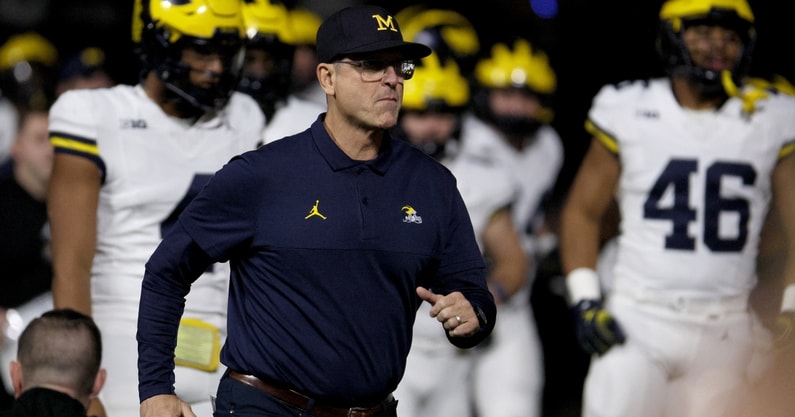Report: Jim Harbaugh felt Warde Manuel was 'not the advocate he needed' at Michigan

The narratives around the early offseason at Michigan are well worn by this point: Jim Harbaugh having some desire to keep coaching at Michigan despite the specter of NCAA sanctions, but still ultimately wanting to end up back on an NFL sideline. And his feeling that athletic director Warde Manuel wasn’t doing enough to support him became a well-known, if somewhat questionable, gripe.
Now a new book excerpt from John Talty and Armen Keteyian’s “The Price: What It Takes to Win in College Football’s Era of Chaos” shines a bit more light on Harbaugh’s specific grievances.
Essentially, Harbaugh didn’t feel that Manuel was being enough of an advocate for him throughout the tumult of the 2023 season and amid contract negotiations with the NCAA investigations ongoing.
From the book:
During a two-day getaway with his wife Sarah on Coronado Island off the coast of San Diego, Harbaugh unloaded to longtime friend Todd Anson. He told Anson he wanted to remain at Michigan but believed Manuel—no matter his public pronouncements—was not the advocate he needed in his corner, particularly in front of the Board of Regents. He also raged against Big Ten commissioner Tony Petitti, who before the three-game Big Ten suspension had promised to meet Harbaugh in Ann Arbor and brief him on what the conference was doing, only to stand him up. [Through a spokesperson, Petitti declined an interview request.]
The day after his outburst to Anson, Harbaugh had an initial interview with the Los Angeles Chargers. Afterward, his tone had softened. Leaning toward taking the NFL job, if offered, he dialed down the Manuel rhetoric, no longer interested in a potential legal battle and fighting people he later said were “gunning for me.” It suggested in attitude and tone that his days in Ann Arbor were numbered.
Indeed they were.
At the time of Harbaugh’s apparent ire with Manuel, he was reportedly offered a deal to make him the highest-paid coach in college football at $11 million annually for a five-year term and rolling over annually.
What apparently caused Harbaugh to bristle was the university hedging against potential new revelations from the NCAA in the ongoing investigation with respect to Connor Stalions and impermissible scouting.
It does not seem that Michigan was angling to create a contractual lever to fire Harbaugh is he was suspended by the NCAA in 2024 — an outcome his lawyer, Tom Mars, indicated was likely inevitable for various reasons if Harbaugh stayed in the college game — but to not be anchored to the head coach if it were to come out that he had a higher level of involvement in the impermissible scouting scheme than currently understood.
Top 10
- 1Breaking
Brady Cook injury
Mizzou QB doubtful to play vs. Alabama
- 2Hot
AJ McCarron slams Bama
'Everyone's worried about f-----g TikTok'
- 3
Coach Prime
Deion Sanders, Colorado are for real
- 4
Not alright, alright
McConaughey admonishes Texas fans
- 5
Travis Hunter
Deion Sanders shares Buffs star will play Saturday vs. Cincinnati
And this dynamic — Harbaugh aggrieved at his employer for wanting a bit of protection against circumstances he oversaw instead of backing him fully — apparently made it that much easier for Harbaugh to do something many assumed was an inevitability for him: Returning to being an NFL head coach.
That departure ultimately made the next decision that much easier for Manuel, as the Wolverines elevated offensive coordinator Sherrone Moore into the head coaching position — and for a fair bit less than Harbaugh would be getting paid.
With the Wolverines the defending 2023 national champions, Moore team looking like a fringe playoff contender in 2024 and Harbaugh set to try and make the Chargers a competitive outfit again, it’s also possible that, in the long run, all parties ended up making the right decisions, ones that might’ve been made anyways, in Harbaugh’s case.
Or, as Harbaugh made it seem, it’s possible Manuel could’ve been a bigger Harbaugh backer and kept the coach in Ann Arbor.